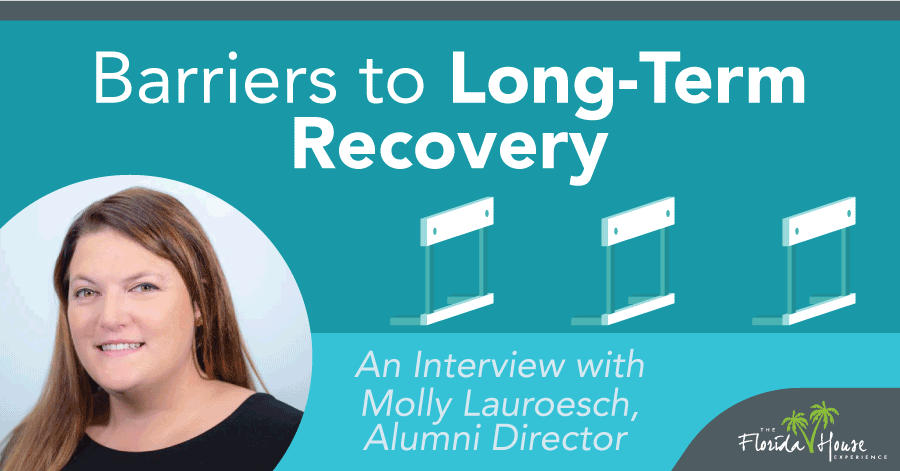
As if just getting to the first step of recovery doesn’t have enough barriers, individuals are likely to face challenges as they navigate paths into long-term recovery. This is true whether you’re dealing with a mental health disorder, substance abuse issue or both. Molly Lauroesch, the Alumni Director here at FHE Health, talks about those barriers and what individuals can do to get over them.
Initial Barriers Don’t Go Away
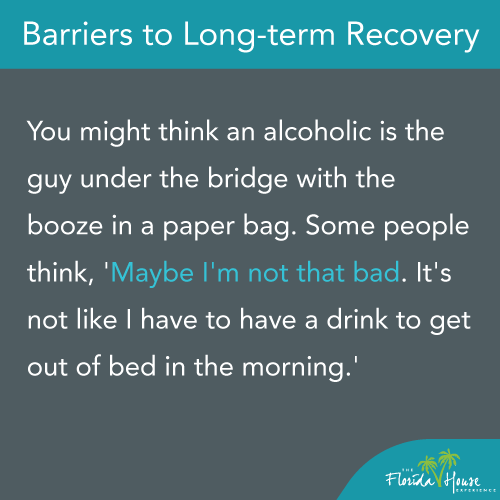 Some of the barriers that keep people from seeking treatment in the first place may actually resurface later in recovery.
Some of the barriers that keep people from seeking treatment in the first place may actually resurface later in recovery.
“One of the big issues for a lot of people is denial,” says Lauroesch. “There are certain stereotypes we have in our head. You might think an alcoholic is the guy under the bridge with the booze in a paper bag. Some people think, ‘Maybe I’m not that bad. It’s not like I have to have a drink to get out of bed in the morning.’ The same goes for those who are more drug inclined. The statement ‘Well, it’s not like I use needles,’ is common. This gets in the way of people coming to treatment.”
But denial can happen even in later stages of recovery, she says. Individuals sometimes believe they have more of a handle on their substance abuse or mental health disorder than they do, or they begin to think they can handle life outside of their recovery support group.
“When I have seen people or spoken to them who have relapsed and returned to treatment, a common statement is ‘I thought I had a handle on it.'” Lauroesch says this type of denial can lead someone to step away from support structures, medications and other methods that are working for them, leading to potential relapse.
Other Challenges for Long-Term Recovery
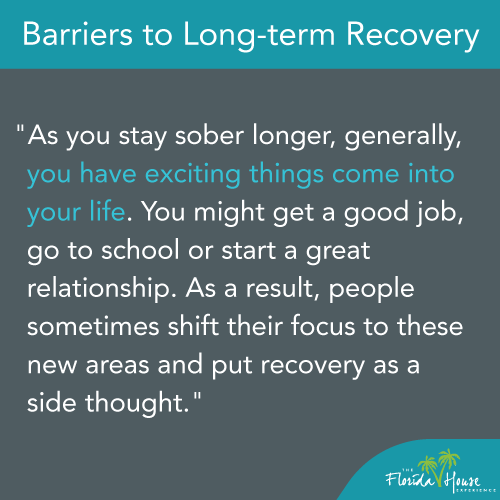 Denial isn’t the only bump in the road of long-term recovery, though. Lauroesch says another challenge can be the natural shift in focus that occurs as life moves on.
Denial isn’t the only bump in the road of long-term recovery, though. Lauroesch says another challenge can be the natural shift in focus that occurs as life moves on.
“In treatment, you learn about your disease and the recovery process and the kinds of pieces that need to be taken care of to stay sober,” she says. “As you stay sober longer, generally, you have exciting things come into your life. You might get a good job, go to school or start a great relationship. As a result, people sometimes shift their focus to these new areas and put recovery as a side thought.”
Not having a good follow-up plan or support structure can also be a barrier, says Lauroesch. “Having people who can relate to you and support you is huge,” she says. People drifting away from their support system is a common trigger for relapse during long-term recovery periods.
Returning to an environment that contributes negatively to substance abuse or mental health disorder, such as a crowd of people who you associate with drug or alcohol use and who still actively participate in that, can be a barrier to long-term recovery too.
Expert Advice for Overcoming Barriers to Long-Term Recovery
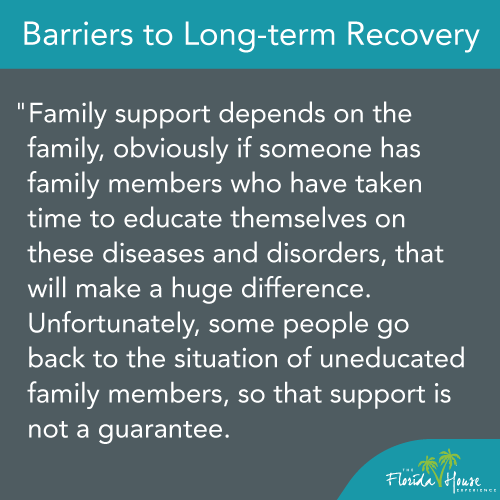 Lauroesch says one of the biggest pieces of advice she can give to those in long-term recovery is to be consistent with what works. It sounds simple, she says, but is harder to put into practice — which is true for any area of life. She uses weight loss and management as an example. “If you maintain good eating habits and make it a point to exercise, you’ll maintain a healthy weight. But if you do that for a couple of months and stray for a couple of months, you’ll get back to your original place.”
Lauroesch says one of the biggest pieces of advice she can give to those in long-term recovery is to be consistent with what works. It sounds simple, she says, but is harder to put into practice — which is true for any area of life. She uses weight loss and management as an example. “If you maintain good eating habits and make it a point to exercise, you’ll maintain a healthy weight. But if you do that for a couple of months and stray for a couple of months, you’ll get back to your original place.”
“If you struggle with a mental disorder and you have found a good once-a-week therapy group and you’re finally on a good medication regime,” says Lauroesch, “don’t try to adjust that on your own. State consistent with what works. That applies to sobriety too. If you found a solution in a 12-step, smart recovery or church group, that’s something you need to stick with.”
Support systems are incredibly crucial throughout recovery, perhaps even years after rehab. Lauroesch says one of the first questions the alumni department at FHE Health asks during follow-up calls with patients is “Have you developed some sort of support system?” Whether you’re dealing with mental health issues or a substance abuse disorder, these are not “grin and bear it” issues and are not things that can be typically handled on your own.
She points out that they mean a support system outside of the family. “Family support depends on the family,” she says. “Obviously if someone has family members who have taken time to educate themselves on these diseases and disorders, that will make a huge difference. Unfortunately, some people go back to the situation of uneducated family members, so that support is not a guarantee. Just because you make the point to get better doesn’t mean your family will make it a point to get better. There needs to be something outside of the family in terms of support network.”
She also notes that individuals may need to evaluate their social crowd after rehab to determine if the people they will be around are beneficial to recovery.
“In terms of building a new support network, it’s a relearning process of living life in a healthy way but also enjoying yourself,” says Lauroesch. She points out that FHE Health’s alumni department works to ensure two to three events each month where individuals can get together to participate in activities with other people who are trying to do the right thing. Some of the activities are organized around service projects, such as helping with a community garden, which can boost your esteem and help you see that you can do something good for yourself and others.
Don’t Hesitate to Seek Help
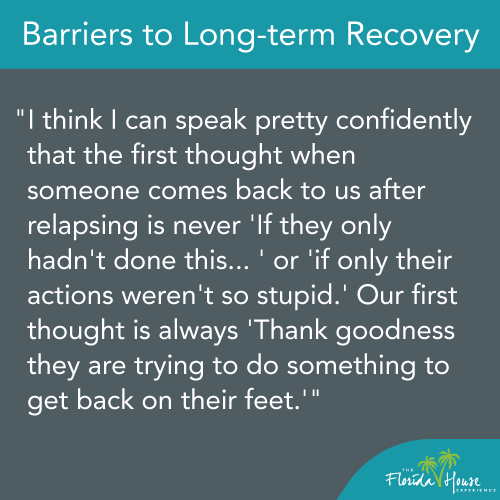 Lauroesch points out that relapse during long-term recovery does happen. A barrier to continuing with recovery can be that someone feels shame that they couldn’t stay the course with sobriety or mental health.
Lauroesch points out that relapse during long-term recovery does happen. A barrier to continuing with recovery can be that someone feels shame that they couldn’t stay the course with sobriety or mental health.
Lauroesch encourages anyone in this boat to reach out for assistance immediately. “I think I can speak pretty confidently that the first thought when someone comes back to us after relapsing is never ‘If they only hadn’t done this… ‘ or ‘if only their actions weren’t so stupid.’ Our first thought is always ‘Thank goodness they are trying to do something to get back on their feet.'”
Letting shame or worry about what people will think to keep you from seeking help after relapse can lead to a longer or more damaging relapse. Lauroesch encourages individuals to call or come back to FHE Health for help. “This is just another step in the process. Just because you hit a bump on the road doesn’t mean you can’t get back on track.”






